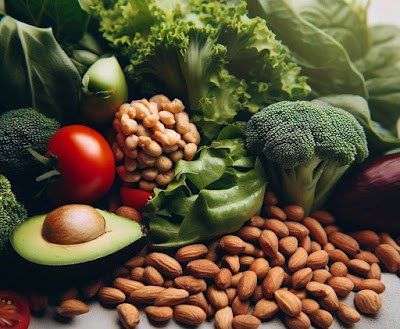Embracing a vegan lifestyle brings numerous health benefits and aligns with ethical and environmental values. However, like any dietary choice, it requires thoughtful planning to ensure all nutritional needs are met. Some common concerns among vegans include the risk of vitamin B12 deficiency and maintaining adequate iodine intake. In this blog, we'll explore these nutritional challenges and provide simple strategies to address them, ensuring that vegans can thrive with optimal health.
1. Vitamin B12: A Vital Nutrient
Vitamin B12 is essential for nerve function, DNA synthesis, and red blood cell production. As it's primarily found in animal-derived foods, vegans are at risk of B12 deficiency if not mindful of their intake.
Addressing B12 Deficiency:
- Fortified Foods: Many plant-based milk, breakfast cereals, and nutritional yeast products are fortified with B12. Regularly include these fortified foods in your diet.
- B12 Supplements: Vegan-friendly B12 supplements are readily available. Taking a daily or weekly supplement can ensure sufficient intake and prevent deficiency.
- Nutritional Yeast: Incorporate nutritional yeast into your meals. Not only is it a good source of B12, but it also adds a delightful cheesy flavor to dishes.
2. Iodine Intake: Supporting Thyroid Health
Iodine is crucial for thyroid function, regulating metabolism, and supporting brain development, particularly in pregnant women.
Addressing Low Iodine Intake:
- Sea Vegetables: Include iodine-rich sea vegetables like nori, kelp, and dulse in your diet. These can be added to salads, soups, or enjoyed as snacks.
- Iodized Salt: Switch to iodized salt for seasoning. However, use it in moderation, as excessive salt intake can have adverse health effects.
- Supplements: If you're concerned about iodine intake, consider a vegan-friendly iodine supplement. Consult with a healthcare professional before starting any supplementation.
3. Diversify Your Diet: Get a Wide Range of Nutrients
Variety is key to ensuring a well-rounded vegan diet. By diversifying your food choices, you increase the chances of meeting all your nutritional needs.
Tips for Diversification:
- Explore Different Foods: Don't stick to the same few recipes. Experiment with a wide range of fruits, vegetables, grains, legumes, nuts, and seeds.
- Colorful Plate: Aim for a colorful plate, as different colors signify various nutrients and antioxidants. Include greens, reds, oranges, yellows, and more.
- Plan Balanced Meals: Strive for balanced meals that include protein sources, healthy fats, complex carbohydrates, and plenty of vitamins and minerals.
Conclusion
Vegans can successfully address nutritional concerns by taking proactive steps to ensure a well-balanced diet. By focusing on vitamin B12 and iodine intake through fortified foods, supplements, and sea vegetables, vegans can support their overall health and prevent deficiencies. Embracing a diverse range of plant-based foods and planning balanced meals allows vegans to thrive with optimal nutrition. Remember, a little awareness and thoughtful choices go a long way in nourishing the body and embracing the benefits of a vegan lifestyle.







